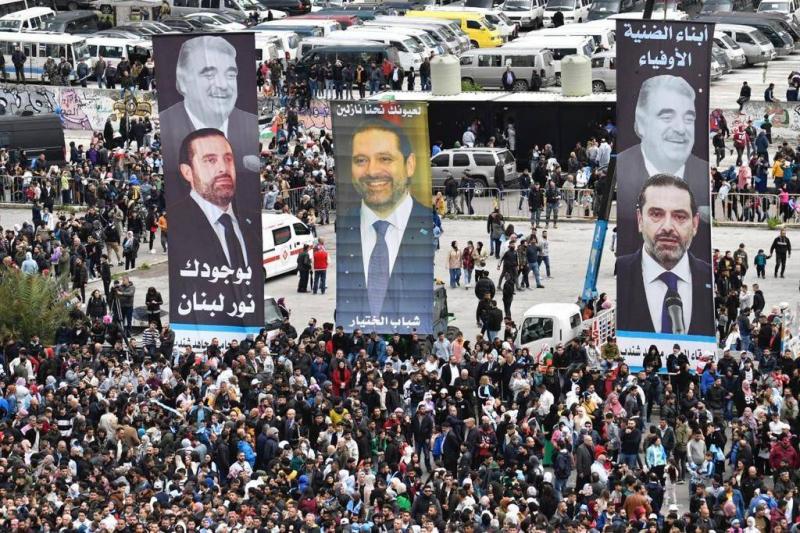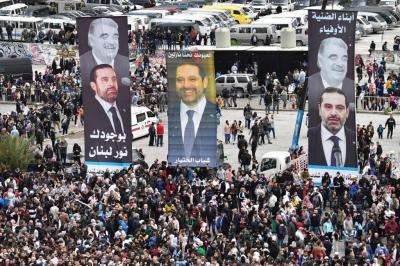President Saad Hariri's week in Beirut "filled the world and occupied people's minds," becoming rich material for analyses and predictions which are anticipated to fade upon his return to his political silence or "silence" in the United Arab Emirates. This political, media, and popular uproar resulted in many conclusions that ranged from disappointment over the continued retreat into the "minor absence," to hopes for a delayed presence until the conditions for a "major return" are available.
Amidst exceptional public support, receptions, meetings, intensive political communications, and diverse media discussions, there was much classical talk about "moderation," consensus, the priority of presidential elections, maintaining balanced friendships especially between the candidates Sleiman Frangieh and Jihad Azour, and the necessity of halting the war in Gaza and southern Lebanon. However, two unconventional issues mentioned by Hariri have not received adequate attention and analysis: "linking the dispute" with the weapon of "Hezbollah" and "making it pay the price" for the assassination of the martyr Rafik Hariri and his companions.
It was not a minor detail when he stated that the party responsible for the assassination, clearly naming "the party," has begun to pay the price, whether in the war in Syria or now (perhaps referring to involvement in the southern war), with a brief and quick mention of the existing "linking of the dispute" with its weapon. Clearly, for the first time, he combined "linking" with "price," unlike the situation during his years leading the government, where "linking the dispute" with this weapon was unconditional and unlinked to a price, remaining open-ended.
Perhaps President Saad Hariri conducted a review of the suffering of his "rule" under the pressure of this linkage. While he hoped for a phase of stability and prosperity through freezing the impact of the weapon on the state and institutions and exchanging leniency with facilitation, he found that "the party" exploited the slogan of "linking the dispute" and tolerance in the matter of the assassination to multiply its infringement on legitimate authority from the presidency to the government, foreign policy, strategic decision-making, and judiciary, especially after the government's downfall due to the movement of the "black shirts" in 2011, chaining subsequent governments up to the present with its monopoly on the decision of war, ensnaring Lebanon in an uncertain fate and forcing heavy costs in terms of blood and livelihoods.
This "tolerance" with the weapon, under the guise of moderation and preventing strife, is likely one of the most significant reasons that frustrated Hariri and led him to retire from politics, albeit temporarily, causing him domestic and Arab issues he now seeks to resolve, and it is obvious that the facts of his political movement and the messages he sent fall within the context of this resolution.
It is also notable that "Bayt al-Wasat" and the shrine were crowded with political parties, excluding an essential party which is "Hezbollah," and no news or information was reported about any off-the-record contact at least, because of the significant embarrassment for "the party" on this occasion. This embarrassment was evident in the absence of any mention or reference from Sayyid Hassan Nasrallah during his recent speech two days ago regarding the anniversary and the occasion, or regarding the accusation of Hariri Jr. to "the party" of the assassination crime, in a direct, public, and decisive manner.
Beyond the occasion, there appears to be a new direction for Hariri and "the Future Movement" towards moving away from the "linking the dispute" theory, certainly not towards strife or civil war, but towards a political and diplomatic effort to lift the hegemony of the weapon from the state, with insistence on a path of moderation, consensus, and preventing strife. It is no longer possible to reproduce the experiences of the last 18 years, specifically the bitter four years (2016-2020), which included obstruction, paralysis, and domination, turning the slogan of "linking the dispute" into a cover for the confiscation of legitimacy and the hollowing out of powers and institutions.
There is no doubt that the custodian of Rafik Hariri's vision, project, and blood realizes the weight of this responsibility, and that the reason for the assassination was not only Hariri's moderation and centrism but also his sovereignty project to liberate Lebanon from all forms of guardianship, whether external or internal. He was assassinated after placing his weight alongside all components of the nation, from Bakri to Mukhtara to Qarnat Shahwan and the new left and free Shiite elite, to build a prosperous, contemporary, independent, and sovereign state, with good relations with Arab nations and the world, unaligned with any axis, always under the banner of "Lebanon First."
With the passage of time, it can be said that the founding Hariri was an advanced model of thought and action for the modernizing Lebanese and Arab renaissance that we now witness its successful and distinctive chapters in the Gulf, particularly in Saudi Arabia, the UAE, and Qatar.
It is also undeniable that the large popular support continues to be a living expression of the legacy of the martyr who was killed by those who do not recognize moderation, peace, modernity, and "linking the dispute." The national Sunni sentiment, and Lebanese sentiment in general, is still shaken by the earthquake of February 14, 2005, and its reverberations in subsequent assassinations. Above that, President Saad Hariri must have read and continues to read well the changes in the region, the new balances, and new sizes resulting from the Gaza war, the conflict in the south, and other "distractions," as well as the previous understandings, agreements, normalization, and diminishing influence, and what will follow in terms of restrictions and reductions, knowing that "Hezbollah" will be in a different position, lighter in weight, both quantitatively and qualitatively, than it was before, which means there is no longer a need for any new "linking the dispute," but rather a political and national balance and a creative contract among the components, outside the equation of strong and weak, armed and unarmed, or a game of numbers.
The week of his active presence in Beirut was a clear test for the new Hariri, and the coming weeks will reveal what this test is and what it is not.




